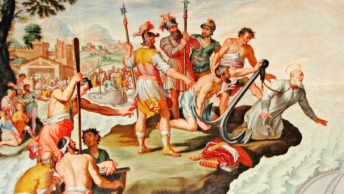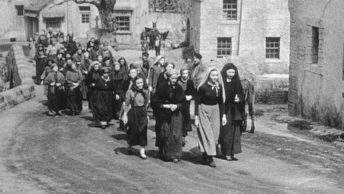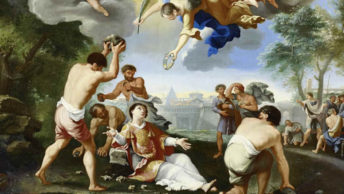For those with a dislike for magazines and newspapers scattered about, don’t come near my house. From a slew of Catholic weeklies, magazines, and Wall Street Journals, the piles abound. Despite the warnings from those who insist that we have kissed the printed word goodbye, I wonder. Why are there still so many piles? And while we’re on the topic of piles, where did the saying come from that “the best always rises to the top?”
Case in point. Just this morning, I happened upon a lady’s monthly journal set near one of my aforementioned piles of magazines. In rifling through some of the articles, one in particular caught my eye. In an interview with two famous actresses, both lovely ladies, one of them began to describe her hot husband’s (the author’s term, not mine) Catholic worldview. She noted that…
He takes his faith pretty seriously, in his way. That doesn’t mean he goes to church all the time. It’s something deeper inside him.
In response to this earth-breaking revelation, I found myself drawn in as the other actress described her own spiritual journey.
I was brought up with the Christian tradition, but had a fairly secular upbringing. The guiding moral principles, the ethical principles, much of the philosophy, if properly applied is very good. And I love Christmas. I know all the carols and all the songs, and my husband used to sing in the choir, so in spite of our secularism, we observe the Christian tradition. And we talk about the Christmas story. It’s a very great story, and I grew up with it. It’s very interesting and full of metaphor.
Now after reading these interviews, I confess that I became intrigued and yearned to explore these theological insights. And so, I decided to dig a bit deeper into the Church’s Magisterial teachings, especially those meant for not-so-hot Catholics such as myself. In finding my way to the Catechism of the Catholic Church, I thumbed to paragraphs 2041-2043 and found the answer to what the Church expects of all Catholics…
“The Precepts of the Church are set in the context of a moral life bound to and nourished by liturgical life. The obligatory character of these positive laws decreed by the pastoral authorities is meant to guarantee to the faithful the indispensable minimum in the spirit of prayer and moral effort, in the growth in love of God and neighbor:
The first precept, you shall attend Mass on Sundays and holy days of obligation, requires the faithful to participate in the Eucharistic celebration when the Christian community gathers together on the day commemorating the Resurrection of the Lord.
The second precept, you shall confess your sins at least once a year, ensures preparation for the Eucharist by the reception of the sacrament of reconciliation, which continues Baptism’s work of conversion and forgiveness.
The third precept, you shall humbly receive your Creator in Holy Communion at least during the Easter season, guarantees as a minimum the reception of the Lord’s Body and Blood in connection with the Paschal feasts, the origin and center of the Christian liturgy.
The fourth precept, you shall keep holy the holy days of obligation, completes the Sunday observance by participation in the principal liturgical feasts which honor the mysteries of the Lord, the Virgin Mary, and the saints.
The fifth precept, you shall observe the prescribed days of fasting and abstinence, ensures the times of ascesis and penance which prepare us for the liturgical feasts; they help us acquire mastery over our instincts and freedom of heart. The faithful also have the duty of providing for the material needs of the Church, each according to his abilities.”
But when you’re hot, who needs the Church?








